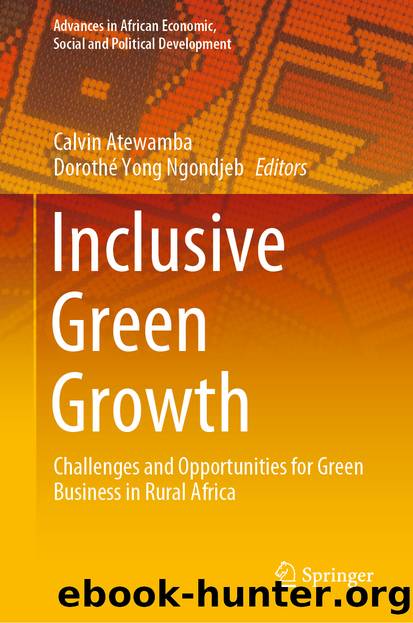Inclusive Green Growth by Unknown

Author:Unknown
Language: eng
Format: epub
ISBN: 9783030441807
Publisher: Springer International Publishing
8. An Assessment of the Impact of Grazing Livestock on Cereal and Tuber Crops Production in Abuja, Nigeria
Julius Ajah1
(1)Department of Agricultural Economics and Extension, Faculty of Agriculture, University of Abuja, Abuja, Nigeria
Julius Ajah
Email: [email protected]
Keywords
Cereal cropsTuber cropsSmall-scale farmersMean responsesLocational impactGrazing routes
8.1 Introduction
Nigeria is one of the countries in sub-Saharan Africa (SSA) that depends on agriculture (Ijirshar 2015) to feed her population of about 163 million (British Council Nigeria 2012). Agriculture is an important source of income and a livelihood option for many households. The major actors in the agricultural value chain are small-scale farmers who constitute substantial proportion of the population and are scattered all over the habitable regions of the country. They constitute about 70% of those who are in agricultural production (Idowu et al. 2011), and they produce about 90% of the total agricultural output in the country (IFAD 2007). The small-scale farmers are diverse and comprise of both male and female farmers in different age categories. They have different abilities depending on circumstances that lead them into agriculture. Their significant contribution to agriculture and sustainable development is one of the reasons they are placed at the center stage of research and development programmes by the Nigerian agricultural policy-makers and planners. Because of their role in the economy, the small-scale farmers are key players in agricultural development as they dominate and determine the total output and productivity of the country. They have the freedom and privileges to produce whatever crop or livestock they desire except those banned by law. They can, as a matter of occupation or interest, embark on crop and/or livestock production. Some engage in agriculture as hobby, while others regard it as their main occupation or business. These farmers are given recognition to the extent that almost all international and national programmes aimed at promoting agriculture and rural development are designed to capture their interest and motivate them to improve their scale of operations and overall productivity. The significant role that small-scale farmers play in Nigeria’s agriculture and economy shows that they are indispensable (particularly in the short run) hence, they deserve continued and unconditional support.
The importance of small-scale farmers in agricultural development cannot be overemphasized. While every effort is being made to encourage and improve their productivity in both livestock and crops in the country, one of the greatest challenges being experienced is the destruction of crops by grazing livestock (Gefu and Gills 1990; Adebayo and Olaniyi 2008; Ofuoku and Isife 2009; Adogi 2013; Okoli and Atelhe 2014). The grazing livestock (cattle, goat, sheep) can encroach into crop fields and destroy crops at any developmental stage—they can eat the stems, seeds, flowers, leaves, tubers or the roots of the crops. However, not all livestock production systems result in the destruction of crops. The destruction depends on whether it is intensive, semi-intensive or extensive system that is adopted by the farmers.
Extensive system of livestock production refers to a system whereby the animals are allowed to roam and look for food unrestricted (Ezeibe 2010). On the other
Download
This site does not store any files on its server. We only index and link to content provided by other sites. Please contact the content providers to delete copyright contents if any and email us, we'll remove relevant links or contents immediately.
International Integration of the Brazilian Economy by Elias C. Grivoyannis(57275)
The Radium Girls by Kate Moore(10901)
Turbulence by E. J. Noyes(7031)
Nudge - Improving Decisions about Health, Wealth, and Happiness by Thaler Sunstein(6629)
The Black Swan by Nassim Nicholas Taleb(6182)
Pioneering Portfolio Management by David F. Swensen(5599)
Rich Dad Poor Dad by Robert T. Kiyosaki(5140)
Zero to One by Peter Thiel(4816)
Man-made Catastrophes and Risk Information Concealment by Dmitry Chernov & Didier Sornette(4728)
Secrecy World by Jake Bernstein(3773)
Millionaire: The Philanderer, Gambler, and Duelist Who Invented Modern Finance by Janet Gleeson(3565)
Skin in the Game by Nassim Nicholas Taleb(3455)
The Age of Surveillance Capitalism by Shoshana Zuboff(3411)
The Money Culture by Michael Lewis(3276)
Skin in the Game: Hidden Asymmetries in Daily Life by Nassim Nicholas Taleb(3259)
Bullshit Jobs by David Graeber(3171)
The Dhandho Investor by Mohnish Pabrai(3161)
The Wisdom of Finance by Mihir Desai(3069)
Blockchain Basics by Daniel Drescher(2883)
